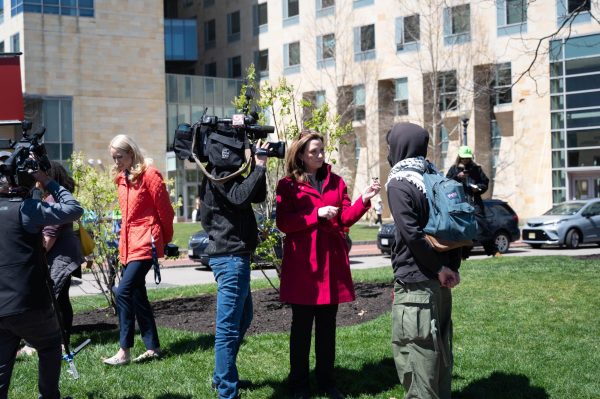Boston Globe, Active Minds open up overdue conversation about mental health in college
Students from several colleges in the Massachusetts area were given the opportunity to open up about mental health issues during a Twitter Spaces jointly hosted by the Boston Globe and Active Minds on Feb. 17.
March 16, 2022
A Boston Globe Twitter space held Feb. 17 in collaboration with Active Minds struck up important conversations about mental health on college campuses.
The Twitter stream was hosted by Laura Krantz, a higher education reporter at the Boston Globe, and Amy Gatto, the senior director of higher education and evaluation at Active Minds. The stream featured student speakers from various local colleges including Harvard University, Dartmouth College, Northeastern University and Worcester Polytechnic Institute, mental health experts including Dr. Zaineb Okolo, and a speaker from Black Mental Matters.
“It’s really important to take every opportunity we can to talk about mental health,” Krantz said in an interview with The News. “I talk to students for pretty much every story … and I learn a lot about how folks are doing and that mental health is a really big concern right now.”
The livestream, which took place on Twitter from 8-9 p.m., had an audience of around 1,900 people. Speakers shared their thoughts on the climate of mental health on college campuses.
Many of the student panelists expressed concerns over the quality of long-term mental healthcare and the lack of adequate preventative measures.
Tanush Jagdish, a fourth-year doctoral candidate at Harvard in the systems biology program, said universities tend to approach mental health through a “band-aid response,” as opposed to more preventative measures.
“Universities are doing a good job with the band-aid portion of helping students. But I do think there’s a preventive portion that students are doing a good job at starting to talk about, but definitely not university admin and professors,” Jagdish said at the panel. “That really needs to change.”
Matt Capone, a sophomore at Dartmouth studying politics, philosophy and economics, spoke about the quality of long-term mental health services in universities.
“The most glaring issue I’ve witnessed is the lack of long-term provisional care,” Capone said at the panel. “One of the largest issues we’ve had on campus in Hanover is the ability to find providers that are available because all of the providers that exist for long term care are pretty much fully booked … which speaks to the state of the students and the mental health higher ed crisis that we are talking about right now. There is a lack of proactive steps being taken to reinforce that care and encourage it.”
Capone said the mental health crisis for college students has been exacerbated by the pandemic.
“I think for many, the problems of mental health in the pre-pandemic world have still persisted,” Capone said. “Not only are students having to grapple with what they’ve had to for a while now, but now they are also needing to reconcile what the pandemic has done to us … aspects of isolation, separation, loss.”
Jagdish also acknowledged that the pandemic brought additional stressors to students.
“There’s a whole bunch of problems, such as food insecurity, that the pandemic itself has brought,” Jagdish said. “There were all of these unique things that came up and that nobody knew how to deal with..”
Allison Buckenmeier, a fifth-year industrial engineering student at Northeastern, says found it overwhelming to handle school at the start of the pandemic.
“Once the pandemic hit it was like I was still trying to handle school while trying to also manage this massive thing going on in my life and everyone’s lives around me,” Buckenmeier said. “It was really overwhelming trying to handle all of that at once.”
Capone said that with the added stressors caused by the pandemic, longer-term care would be a large area of growth that institutions should work toward.
Ellen Burstein, a senior at Harvard studying social anthropology, is one of the leaders of “The Harvard Public Opinion Project,” a student-run national poll by the Harvard Kennedy School and the Institute of Politics at Harvard College.
Burnstein said over the past year, the organization issued a national poll on mental health to look at common symptoms of depression and anxiety among people ages 18 to 29.
“We’ve found in the past two polls a really disturbing sign of a national shadow pandemic of mental health among this generation,” Burnstein said at the panel. “We’ve consistently seen over 50% of our respondents have symptoms of severe depression and over 25% have expressed that they’ve had regular thoughts of self-harm or suicide. … It’s a reminder that this [is] a national problem both among college students.”
Both Jagdish and Capone acknowledged that at their schools a competitive culture normalizes toxic stress and perpetuates the mental health crisis on campuses.
“Up in Hanover, if ‘you are not working, you are behind.’ It’s a really big issue because you are so deeply entrenched in this culture where it’s so difficult to recognize what is good, healthy stress and what’s bad,” Capone said.
Gatto, the representative from Active Minds, emphasized the importance of institutions in fostering a healthy community for its students. This includes, she said, ensuring students of all backgrounds and identities feel adequately represented and taken care of. Gatto stressed the importance of understanding how systemic injustices can affect mental health.
“It’s beyond just having a conversation with students,” Gatto said. “It’s listening to students, and also understanding the society we live in and making sure that we are proactive to address injustices and not be complacent with them.”
Gatto also acknowledged the implications of the conversations around mental health coming from a place of privilege.
“It is important to think about how can institutions ensure they are elevating and amplifying the voices of all students,” Gatto said. “It goes beyond just having the conversations. It’s the institutional commitment. Campuses should make sure there is representation in counseling services, among faculty, for members with diverse and minoritized identities … understanding how systemic injustices can affect mental health.”
“It is okay to not be okay. It is okay to ask for help,” Gatto said. “It’s okay to not even know why you are asking for help or what that means.”


















